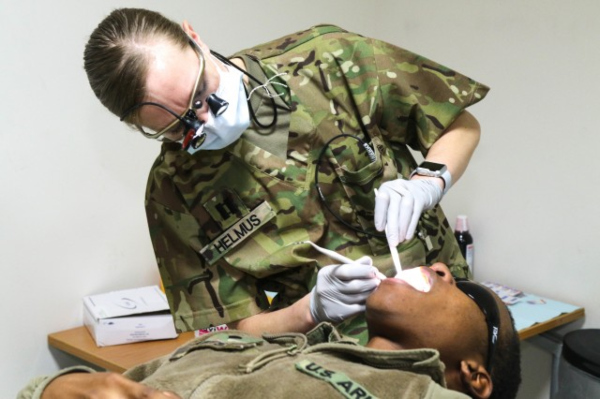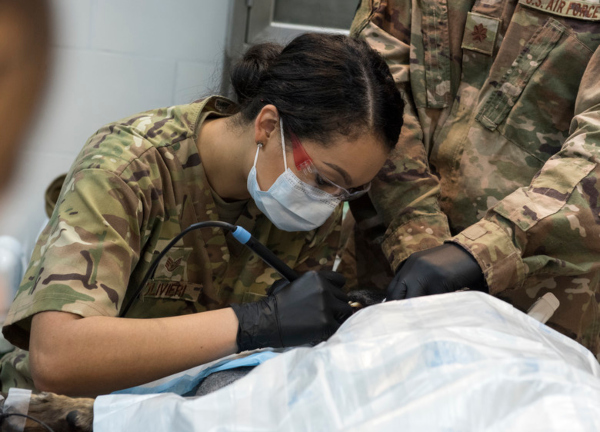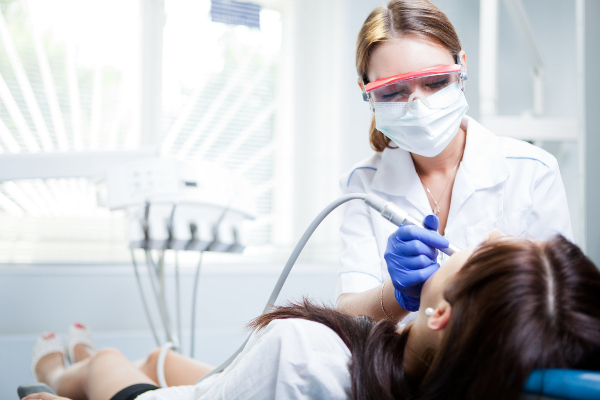Your dental health is far more important than many people realize.
The condition of your mouth, teeth, and gums impact your general health in several ways.
It’s why the U.S. Armed Forces have guidelines on dental health requirements for new members seeking to enlist in the military.
Learn more about military dental requirements and disqualifications below.
Related Article – 20 Health Conditions That May Disqualify You From Military
Military Dental Requirements and Disqualifications

“Healthy mouth, healthy body” is the stance that everyone should take when it comes to oral health care.
Yet how many people do you know who regularly brush their teeth, floss, and attend routine checkups?
Your dental health provides clues about the overall health of your body.
The mouth is a haven for bacteria and the worst types of it can enter your digestive and respiratory tracts, contributing to disease.
Daily brushing and flossing go a long way in keeping bacteria in the mouth under control.
Keep in mind that:
- The mouth and body are synonymous with each other.
- Oral health shares common risk factors with other chronic diseases and health conditions.
- Poor oral health contributes to cardiovascular disease, endocarditis, and pneumonia, as well as pregnancy and birth complications.
The U.S. Armed Forces feature dental requirements for people looking to enlist in the military.
You need to meet military dental requirements to avoid disqualification.
The military examines your health condition during MEPS (Military Entrance Processing Station).
You may also receive a physical examination through the DoDMERB (Department of Defense Medical Examination Review Board).
The U.S. military relies on these medical screenings to determine the state of your health, including dental health.
The military examines you from head to toe to make sure you are “fit for service”.
List of Dental Disqualifications

Military dental requirements and disqualifications are put in place to make sure you are physically able to serve in the U.S. Armed Forces.
Here is a list of dental disqualifications you need to be aware of for enlistment:
Braces (Orthodontic Appliances)
The military considers braces “orthodontic appliances.”
Unfortunately, individuals that currently have braces are not allowed to join the U.S. military.
However, recruits may still consider the Delayed Entry Program.
The military will not make you active duty though until braces or other orthodontic fixtures are removed entirely.
Retainer appliances are allowed in the military so long as active orthodontic treatment is satisfactorily completed.
A local military recruiter can provide more details about enlisting in the Delayed Entry Program while you complete orthodontist treatment such as braces.
Chewing Issues
The military disqualifies dental conditions that prevent you from chewing normally.
Congenital problems or other injuries that impact normal chewing need to be surgically repaired.
If that is not possible, the U.S. Armed Forces consider it a disqualifying health issue.
The good news is you can get a waiver if you have surgery for a chewing issue that is correctable.
Ask a local military recruiter for more information about the matter while pursuing enlistment.
Disease from Teeth Removal
Everyone loses teeth when they are young.
However, the military takes a different stance when it comes to adult teeth, especially injuries or diseases which caused teeth removal.
Anything that prohibits you from chewing food normally is a disqualifying dental health factor.
The military considers cases of dental implants following adult teeth removal differently.
It reviews each procedure differently yet makes sure the operation removed any potential complications down the road before granting a waiver.
The loss of more than four contiguous teeth is a disqualifier unless restored by appropriate and well-fitted fixed bridge, implants, or removable dentures.
Keep in mind that a waiver is not guaranteed.
It relies on approval from a military medical review board.
Excess Cavities
The military deems eight (8) or more teeth with visually apparent decay or cavities to be grounds for disqualification.
The Armed Forces do not enforce disqualifications related to cavities so long as the problem has been addressed.
You just need to make sure all dental repairs are treated before you are sworn into the military.
Lastly, the military accepts individuals going through endodontic care (root canals) through the Delayed Entry Program.
However, a health provider must present documentation to the Department of Defense explaining that endodontic treatment will be completed prior to becoming active duty.
Jaw Diseases or Tissues
Diseases in the jaw or connected tissues that prevent normal functioning are not approved in the military.
For conditions treatable by maxillofacial surgery, a minimum of 6 months of time must pass before they’re eligible for enlistment or a commission.
Jaw diseases that disqualify recruits include temporomandibular disorders and myofascial pain.
Unfortunately, temporomandibular disorders and myofascial pain are not waivable under current standards.
Malocclusion
Severe malocclusion that interferes with normal mastication or requires regular treatment is disqualifying in the military.
The military extends its guidelines to include any malocclusion that impacts the relationship between the mandible and maxilla that prevents satisfactory future prosthodontic replacement.
The military does not appear to currently provide any waivers for malocclusion, either.
Related Article: Can You Jon The Military With Flat Feet?
Frequently Asked Questions (FAQ)

Dental health is a little confusing when the military references technical terms.
What questions do you have about military dental requirements and disqualifications?
Can I have braces while serving in the military?
It is possible to get braces while you’re serving in the military, but it isn’t possible to join if you’re in the middle of treatment.
In some cases, the military may even provide the necessary care for free.
However, you’ll need to go through your dental clinic to find out what the options are. In some cases, you can get braces but will need to cover the expense yourself.
It’s important to understand that the Department of Defense has different medical standards for those who are already on active duty and those looking to enlist or be commissioned.
The military won’t accept new recruits with braces, and you’ll have to wait until you’ve completed orthodontic treatment.
If you’re already in the service, check with your dental provider to find out what options are available to you.
How are ‘bad teeth’ characterized?
Bad teeth are defined as more than 4 contiguous teeth missing or more than 8 obvious cavities that require treatment.
It can also include oral diseases like temporomandibular disorders and myofascial pain that required treatment in the last year.
Note that many of these conditions can be treated before joining the service, so should not provide any long-term obstacle to enlistment or commissioning.
Can you join the military with dental implants?
The military reviews every dental health problem during MEPS (Military Entrance Processing Station).
Department of Defense Instruction 6130.03, Volume 1 states that “a
well-fitting prosthesis (e.g., fixed bridge, implants, or removable dentures)” to replace missing teeth is fine as long as they allow you to chew and consume a normal diet.
Can I join the military with cavities or a root canal?
Yes, you can join the military with cavities as long as there are fewer than eight (8) visible.
As far as root canals, you’ll need to either wait until the treatment is complete or sign up for the Delayed Enlistment Program. You won’t be able to ship to boot camp in the middle of treatment.
Will the military fix my teeth?
The Armed Forces use a MEPS exam or DoDMERB to determine the condition of your mouth, teeth, and gums.
The military may provide funds for the treatment of oral health problems that are correctable.
However, you will have less control over your treatment plan since it is managed by the government.
Furthermore, the military will probably not pay for you to have braces while you are enlisted in the military.
A service branch may grant a waiver if you need braces, but it will prevent you from being deployed until the treatment is completed.
The only exception is invisible aligners like Smile Direct or Invisalign.
Surprisingly, the military does grant a waiver for invisible braces in most circumstances.
Why does the military pull out your wisdom teeth?
The military makes it a common practice to remove wisdom teeth during boot camp or shortly thereafter.
Why?
If the military deems that your wisdom teeth could lead to a future problem, the government will insist on removing the teeth.
The U.S. Armed Forces prefer to have wisdom teeth removed as soon as possible because it avoids future interruptions later on down the road.
Active-duty personnel that need leave for a health condition like wisdom teeth removal during deployment hampers his or her personal growth, as well as the rest of the unit.
Usually, the Department of Defense does not give you a choice in the matter, but if you have the option we recommend removing wisdom teeth during boot camp.
Related Article: Can You Join The Military With Asthma?
Conclusion
Military dental requirements and disqualifications are set in place for your general well-being.
Dental health is critical to maintaining good overall health.
Consequently, the military has several dental issues such as braces and adult tooth removal which may disqualify you from the military, at least temporarily.
That said, once you’ve enlisted, the military will do what’s necessary to keep you and your teeth healthy.
If you have more questions about military dental requirements and disqualifications, speak to a local military recruiter.
- Replacing Dog Tags: 6 Things You Need to Know - June 28, 2024
- Navy OAR Test Study Guide - June 24, 2024
- 10 Best Sniper Movies of all Time - June 20, 2024
Originally posted on February 15, 2020 @ 5:21 pm
Affiliate Disclosure: This post may contain affiliate links. If you click and purchase, I may receive a small commission at no extra cost to you. I only recommend products I have personally vetted. Learn more.

